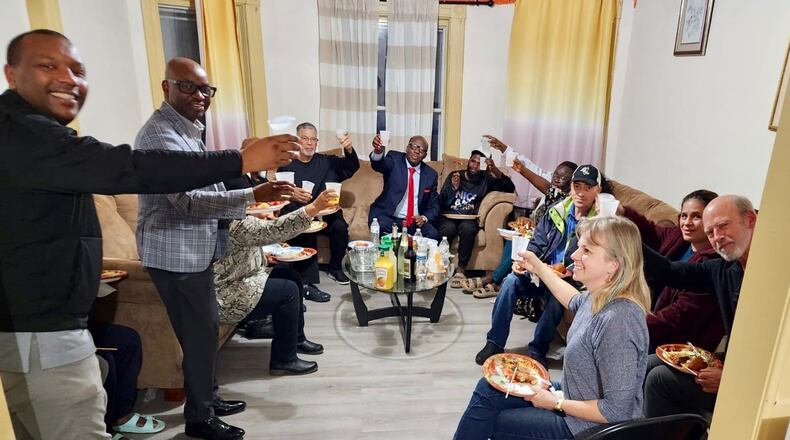“We can shelter up to 24 individuals at a time at the House, and once the refugees get their bearings and are ready to transition from the House, they often locate in the Dayton area, now the largest concentrated Rwandan community in the country,” said Loic Kiza, a native Rwandan who serves as president of the board.
Kiza said their annual goal is to see that incoming refugees have a place to live, help them acclimate to their new situation, and help coordinate their immediate needs — such as finding schools for children, obtaining jobs, honing language skills and providing education for adults. “We strive to enable men, women and children to achieve a sense of normalcy despite the difficulty they have experienced in the past.,” he adds. “We believe that we are using a holistic approach with the Rwandans themselves and with the collaboration of supporting people and agencies.”
Jean Damescene Harerimana first came to the House of the People in 2017 with his wife and his daughters. After being in transition housing for about a year, he volunteered to be the house manager.
“The House of the People has been a blessing to so many of us, so I volunteered to be the fifth manager there,” Harerimana said. “This made me feel good as I was finally able to start giving back within my capacity.”
Harerimana said it’s not easy coming from French speaking countries and learning a new language and culture. ”I cannot express enough gratitude towards people who have been contributing to keep people like me in this safe haven as we start a new chapter of our lives.”
Resident Jean Claude found out about the House of the People when he was at a homeless shelter in Maine.
“The House of the People served us at the lowest point of our lives,” he says now. “Having the House of the People is like having another mother from another earth,” he said.
What they need
The House of the People has relied on donations from individuals, churches and granting agencies in the area throughout its existence.
“From our humble beginnings, the House of the People has made a significant contribution to the Dayton community’s immigrant population — something that Dayton is rightfully proud of as a welcoming community,” said board member David Leach. “It is a continuing legacy to the many who have contributed in various ways over the past five decades and in particular those who planted the earliest seeds.”
He credits founder Pio Celestino as well as current active board members; many have been connected with the organization since the early days. Currently, 75 percent of the board is made up of Rwandans, many of whom have come here through the House of the People.
Here’s what the new residents can use as they arrive at the shelter:
- New queen size bed sheets
- Towels (new or gently used)
- Toiletries
- Blanket/comforters (new or gently used)
- Baby wipes, diapers
- Menstrual products (or gift cards for these)
- Gift cards for new mattresses, groceries, cleaning supplies
- Bus passes
- Cooking pots (new or gently used)
- Plates (new or gently used)
- Cups (new or gently used)
- Forks, knives, spoons (new or gently used)
- Spatulas (new or gently used)
You’re asked to arrange a delivery time by contacting House Manager, Jean Damascene Harelimana at 937-367-0393 or jdamascene011@gmail.com. These items can then be delivered to 51 Holt St., Dayton.
To learn more about The House of the People or get involved, visit thehouseofthepeople.org.
Meredith Moss writes about Dayton-area nonprofit organizations and their specific needs. If your group has a wish list it would like to share with our readers, contact Meredith: meredith.moss@coxinc.com. Please include a daytime phone number and a photo that reflects your group’s mission.
Credit: Contributed
Credit: Contributed
Credit: Contributed
Credit: Contributed
Credit: Contributed
Credit: Contributed
Credit: Contributed
Credit: Contributed
About the Author






